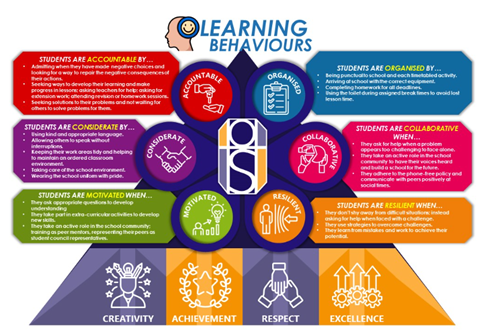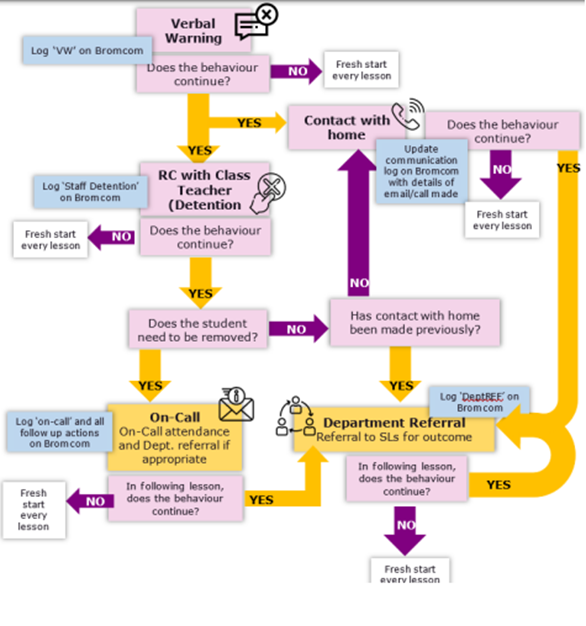Therapeutic Thinking: Developing school processes.
‘EMPOWERED TO ACHIEVE, INSPIRED TO EXCEL’
Context:
Oriel High School is a maintained community secondary school for pupils aged 11 to 18, based in Crawley. There are over 1400 students on role at the school, making Oriel a larger than the average-sized secondary school.
At the most recent inspection in October 2019, Ofsted reported that, ‘Pupils greatly enjoy coming to school. They love being part of Oriel’s ‘purple army’ and they wear their uniform with pride. Pupils described their school as ‘warming’ because it has a community feel. Pupils and teachers get on extremely well; we saw them chatting happily together in lessons and around the school. Pupils value and take care of their learning environment.’ Oriel continued to be rated as ‘Good’.
Oriel’s Pupil Premium cohort is 13.6%, Free School Meals is 20.7% and the number of students with an identified Special Educational Need is 19.4%.
Jake Clarke (Director of Learning: Behaviour) and Mark Harrison (Assistant Headteacher) attended the 3-day tutor course training in February 2023. They talked about how they have introduced the approach across the whole school.
Why did you want to take part in Therapeutic Thinking training?
The behaviour systems had just changed prior to attending the Therapeutic Thinking launch day in January 2020 so the school weren’t quite ready to attend any training at that point. Jake and Mark felt that the previous system no longer aligned with the schools’ evolved values. They wanted to create something for ‘Oriel’ focusing on learning behaviours. The Therapeutic Thinking approach aligns well with this focus.

What are the actions so far and how have they impacted?
Jake and Mark presented their ideas to the Senior Leadership Team (SLT), thinking about what current processes they wanted to keep and which elements of the Therapeutic Thinking approach they wanted to adopt.
Jake and Mark thought carefully about who they would initially train and what the potential barriers might be. They decided to train all of the SLT, middle leaders and everyone who held a TLR to promote collective responsibility. These staff were introduced to the approach and tools and explored how to implement these into their systems.
Prior to these changes key SLT had been regularly called upon to respond when there was a behaviour incident. The new approach meant all staff were now accountable and relationships are key. Heads of Communities have embraced this change.

Processes for behaviour incidents: They now use a referral system or a department referral when there has been an incident and detentions are now used for restorative conversations. They have rewritten the Behaviour Policy and are implementing this, ensuring all staff are following the updated policy.
Language: the school are using the language of unsocial, anti-social and pro-social and matching logical consequences to the incident.
‘Pro-social behaviours are those behaviours and actions that benefit others and are key to a healthy functioning society. At Oriel we explicitly teach pro-social behaviours and have clarified these in six learning behaviours: Organised, Resilient, Considerate, Motivated, Collaborative and Accountable.’ Policies – Oriel High School
Behaviours are recorded on Bromcom in categories which are linked to learning behaviours. There is explicit teaching around the learning behaviours and each half term there is an enhanced focus on one key behaviour. Jake and Mark are beginning to notice trends and link these to learning and the behaviour curriculum. This also supports staff to identify and track pupils behaviour and wellbeing, data is much richer as a result. Jake and Mark report that students are beginning to understand the processes that are in place.
Each department has developed agreed ‘Teaching WalkThrus’ and clear routines appropriate to their subject. These may look different between faculties, however their presence remains consistent. These have become a part of the appraisal process.
Internal observations have noted that when walking around there is an increase in positive interactions, a reduction of students in the corridors during lesson time and an increased feeling of calm.
Their approach towards internal isolation has evolved– the space is now used to provide protective consequences. The name of the area has also changed to the ‘Personalised Learning Centre’ (PLC). There are fewer referrals to the PLC now that other systems are in place. Students are able to articulate why they are in there. Feedback about the changes has been positive and the work that is completed in the PLC is focused on reducing further incidents.
Jake and Mark are developing the use of Zones of Regulation throughout the school to promote consistency from feeder Primary schools who also use the resource. Parents and students are noticing these consistencies.
What are your next steps going to be?
- Jake and Mark are going to revisit the Therapeutic Thinking training with the SLT and the middle leaders. They have committed INSET days and twilight sessions with a focus on behaviour. Each department has its own staffing clusters with have developed agreed ‘Teaching WalkThrus’ and routines.
- Ensuring data matches the day-to-day interactions, with staff encouraged to record all behaviours on Bromcom, including prosocial.
- Developing the use of the Early Prognosis resource, aligning it with tools they already use.
- Enhanced focus on wellbeing, supporting students to de-escalate and identify ways to support them to regulate.
- Planning a ‘Student voice’ panel to gather pupil views.
Top Tips:
- Following the training, make the approach your own to fit your school culture and ethos. Know your local context.
- Emphasise how this is a journey and an ongoing process.
- Have systems in place for robust reporting and analysis to measure impact.
Last updated 27 March 2024
 Tools for Schools
Tools for Schools